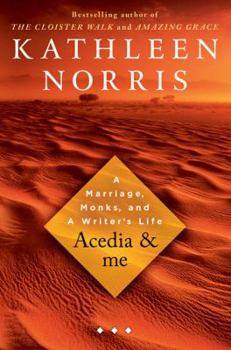Acedia & Me: A Marriage, Monks, and a Writer's Life
Select Format
Select Condition 
Book Overview
The extraordinary New York Times bestselling masterpiece from "one of the most eloquent yet earthbound spiritual writers of our time ( San Francisco Chronicle ). Kathleen Norris had written several... This description may be from another edition of this product.
Format:Hardcover
Language:English
ISBN:1594489963
ISBN13:9781594489969
Release Date:September 2008
Publisher:Riverhead Books
Length:334 Pages
Weight:1.26 lbs.
Dimensions:1.2" x 6.4" x 9.0"
Age Range:18 years and up
Grade Range:Postsecondary and higher
Customer Reviews
5 ratings
Acedia and Me
Published by Thriftbooks.com User , 15 years ago
Extremely well written - weaves a personal narrative with History and a treatise on a specific mood disorder. Interesting, enjoyable and constructive information.
Just as promised!
Published by Thriftbooks.com User , 15 years ago
I received this book in the condition it was promised and on time. No complaints at all!
Acedia and me sales transaction
Published by Thriftbooks.com User , 15 years ago
The book price was great and the service excellent. Thanks for being so accommodating.
Why are we so depressed?
Published by Thriftbooks.com User , 16 years ago
I have long harbored an intuition that the desert fathers and mothers have provided humanity with some of the keenest insights into the depths of the human conidion. Kathleen Norris in her newest book Acedia and Me: A Marriage, Monks and a Writer's Life, demonstrates a similar intuition, as she probes the little-known temptation acedia, which - although its usage has all but ceased in the English language - is alive and well in our consumer culture. What is acedia? Well, considering that Norris devotes a 40+ page appendix to laying out definitions and illustrations from historic and literary sources, one could say that acedia is hard to nail down. In brief, acedia comes from Greek roots that denote a lack of caring and could be described as a sapping of energy, motivation and focus that often leads to a restlessness culminating in "a hatred for the place, a hatred for [one's] very life [and] a hatred for manual labor" (xv) - to use the words of the fourth century monk Evagrius. The desert monks found that acedia often set in during the heat of the mid-day hours, which also led some to refer to it as "the noon-day demon." Norris uses her own life, and particularly the story of her marriage to the late poet David Dwyer, as a framework to explore the multi-faceted temptations of acedia in the present age. Thus, her writing style follows in the pattern established in her previous autobiographical works including Dakota and The Cloister Walk. Her crystalline prose penetrates to the heart of the reader and her frequent illustrations from history (in this case, especially those from the monastic tradition) and literature draw the reader into a grand conversation about temptation, sin, desire, grace and hope - i.e., the fundamental elements of human nature. One of the key themes of this book is an exploration of the dynamics of the relationship between acedia and depression. From the definition given above, on can easily see the parallels, but Norris warns us early in the book that "It is an easy temptation to equate acedia and depression" (20). Thus, although frequently returning to her explorations of how the two interact, she is clear to draw the distinction between the spiritual experience (acedia) and the medical condition (depression). And therefore, she recognizes that sometimes one needs to treat the medical symptoms with therapy and/or pharmaceuticals in addition to addressing acedia with the three traditional monastic non-negotiables: community, stability and prayer. Norris's wisdom here should be taken to heart: let us first recognize and address the temptation of acedia by being rooted in community, stability and prayer. If then, the symptoms of depression are still unbearable, then let us explore medical therapies. How often do we jump to the pursuit of the latter, when we are unwilling to work through the real or perceived challenges of the former! As we noted above in Evagrius's definition of acedia, one facet of ace
Beautiful
Published by Thriftbooks.com User , 16 years ago
Kathleen Norris has written a beautiful memoir in this book. The work is also a study, an exposition, really, of the ancient concept of Acedia (accidie, and many other spellings), which is a sort of spiritual torpor. Many moderns would call it "depression," but it is a separate condition. It is also sometimes confused with the spiritual "dark night," but that is different also. This is a kind of boredom, lethargy, sick of caring, sick of everything, that the ancients saw as a kind of spiritual attack. Norris discusses her own battles with this condition. She also movingly writes about her husband, the brilliant poet David Dwyer, their life together, and his illness leading to his death, and how difficult it is to find your spiritual place again, once everything changes. Norris finds, not solace really, but endurance in the psalms and in small everyday activities, which are also the ancient treatment for acedia. Having endured acedia myself during a few periods of my life, I felt moved to tears reading this. I hope the writing of it helped Norris; I know for sure that the reading of it will help many souls. I recommend this excellent book with no reservations.





